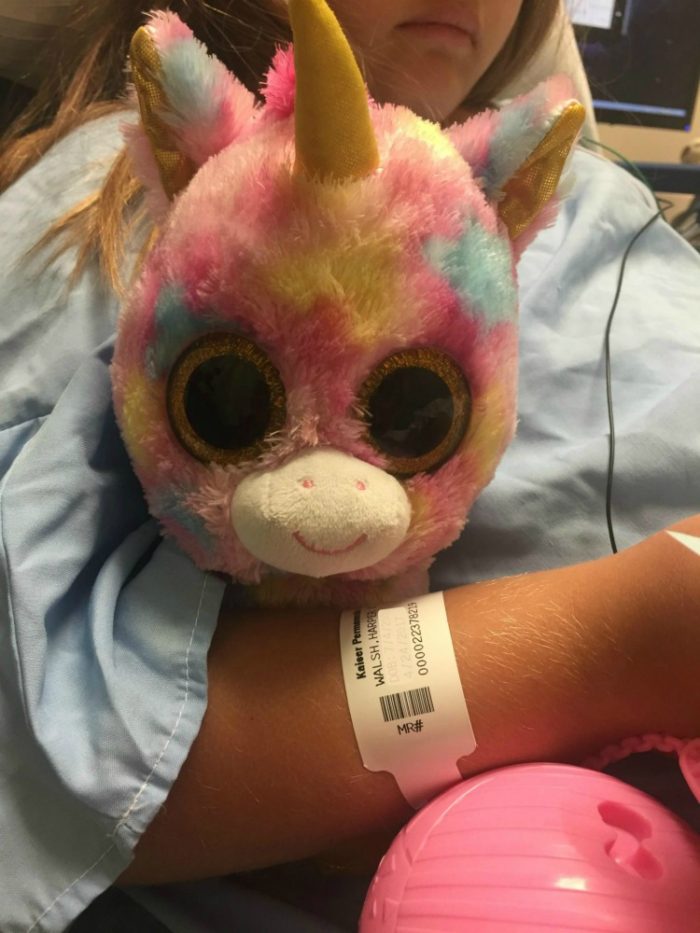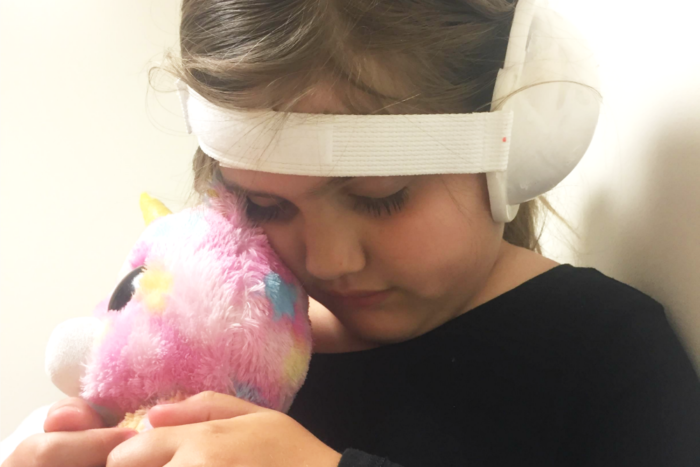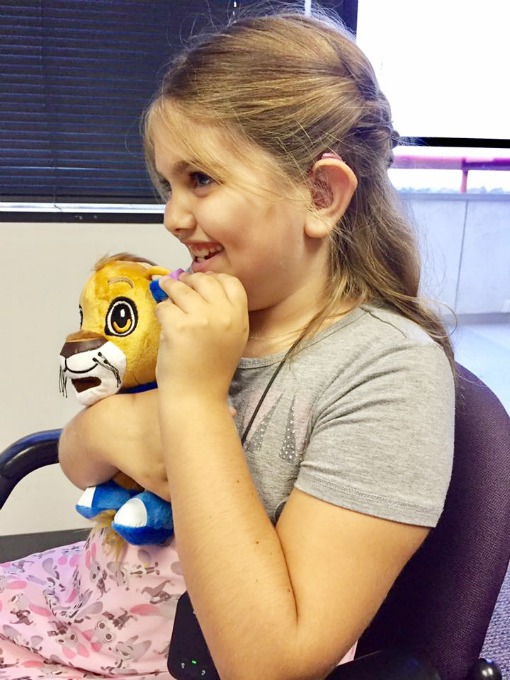We passed the one-year mark with a hearing loss diagnosis, a lot of people have asked how we figured out our daughter was deaf. Let’s just go ahead and give the disclaimer that there’s a lot of mom guilt and a healthy amount of annoyance strewn throughout this post. Read past that for reminders to trust your gut and some advice on how to advocate for your child, plus a really happy moment for our family, too. Because really…How could I not know my daughter was deaf?
This post contains our experiences and should not be used for medical advice. Please read my disclosure policy for additional informtion.
You can read about Harper’s diagnosis and surgery and the post-surgery hearing update for background, and I’ll reference those steps in the process throughout the post also. As we are new to this, I struggle with the semantics. I use “hard of hearing” when talking to my daughter about her hearing loss. But the degrees of loss (mild, moderate, severe, profound) gloss over how huge the challenges are. Oh, mild loss, that’s not so bad. But for those with even a mild loss, participating in a conversation can be quite frustrating. So I’ve opted to use “deaf” when speaking with those outside of the Deaf community.
No History of Deafness
Harper was born with normal hearing. She suffered from chronic ear infections her whole life, and received her first set of tubes at 4. Part of the challenge with these infections was they just didn’t go away. We’d give the prescribed antibiotics, but at a 2-week check an infection would still linger.
Hanging out & looking at the Highlights magazine in the waiting room. She was seriously the cutest preschooler ever.
Normal procedure for tube placement is a hearing test. Harper demonstrated mild loss post-surgery, but her young age was blamed for errors in the test. Should have been sign #1.
Despite bringing her to her annual physicals, Harper never had a hearing test performed. I was never a huge fan of my pediatrician, but she was nice enough. My biggest complaint with her was she would never pull the trigger. She claimed my oldest daughter had “asthma-like symptoms” or “symptoms consistent with pneumonia.” Never would commit herself to a diagnosis. It wasn’t until I switched doctors that I realized those simple hearing tests could have saved us so much time, and so much of Harper’s hearing.
Speech Therapy
Alright, so the doctor maybe-possibly-should have-could have done more monitoring, knowing that she had chronic ear infections and had scored with mild loss after surgery. Enter the next villain in this scenario. Villain isn’t very nice, but like I mentioned it’s been a year and I’m still angry. Sad, frustrated, angry.
Starting at 4, I mentioned concern about my daughter’s speech to her teachers. They each in turn placated my concerns, telling me to wait until 2nd grade. But people outside of our immediate family had a lot of trouble understanding her. Even my parents, who see her daily, had trouble. Mostly it was vowels and vowel blends. Some of the most troublesome were -er and -ar. Guess what? She has both of those in her name!! But I was told to wait, so I waited.
Parent Tip: Don’t wait. There are speech benchmarks for each year of life. If your child isn’t meeting them, seek help.
First grade was awful. My bright child was struggling at school. Her teacher wasn’t concerned or just didn’t care. Again, that’s not a very nice thing to say. But you know what, sometimes the truth hurts.
I saw my child struggle. I saw her test scores drop from working above grade level to sink into areas denoting urgent intervention. The last straw was having her picked out of a crowd at a science demonstration for kids. The host asked her name repeatedly, but no matter how many times she repeated herself she couldn’t say her name. She was almost 8, and couldn’t say her name. Something had to be wrong.
Parent Tip: Fluctuations are normal with school testing. Bad day, funky questions. Huge drops, however, are cause for concern.
With a summer birthday, her annual physical took place after the school year ended. I mentioned to the doctor my concerns about speech. The doctor said something along the lines of her being more nasal-y than my other children. Finally, she performed an in-office hearing test. When Harper failed and I asked if I should take her for a full exam, the pediatrician said to ask the speech therapist. I doubt the outcome would have been different, but to have known that much earlier and start getting her help sooner would have been nice.
But, ladies and gentlemen, this is where the story improves. Where I pushed a little harder for answers and found people who could help.
My daughter started speech therapy. After a few sessions, her therapist recommended a hearing test. This is the time where everything speeds up in my mind.
This year has brought so many amazing moments for us. So I’m interrupting the bad news to showcase the progress she made in speech therapy. The first time she said “Harper,” I cried and cried (and then cried more when she wasn’t around). Back to the story…
Audiology Appointments and Diagnosis
My daughter didn’t pass the hearing test. But what was really shocking was when the audiologist talked directly to Harper & had her repeat words, Harp did great. When she covered her face with a clipboard? Harp had no clue. She had been lip reading this whole time! And the truth is, she got really good at it!
How did I not know my child was deaf? Well, the loss was gradual and my daughter is a proficient lip reader.
From audiology, we went to an ENT. I opted for a new one since I never loved the first one, who coincidentally was recommended by the pediatrician I didn’t love either. The ENT switched up allergy medicine and said she had “glue ear”. Come back in a month, he said.
A month brought no change so another surgery was scheduled to reinsert the tubes in hopes that it would clean out the gunk (<— medical term).
It was just minutes after Harper went in for surgery that the surgeon came to speak with me. If all of the months sped up, the next few moments are kind of a blur. “It’s not cancer.” That’s what he started with and lead me to stop processing words. What good news can follow that? I spelled out c-h-o-l-e-s-t-e-a-t-o-m-a on the notes on my phone. A cholesteatoma, Google would soon tell me, is a non-cancerous growth often caused by repeated ear infections. A tumor, a cyst, a collection of crap — I’ve seen it called all of these.
I’ve written about this phase of our life before, and if you’ve landed here this may be of interest to you.
An Update on her Health the Day of Surgery
The longest 4 1/2 hours of my life. Matt and I sat there silently for the majority of the time. We pretended to drink our coffee. Knowing me, I probably added things to my Amazon cart.

What to Expect from a Cholesteatoma Surgery
To watch your child suffer is heart-wrenching. The first few days were awful. Our family and friends brought cheer in the form of LOL Surprise Dolls, coloring books, and other presents. On Day 4, she woke up and was totally herself again.

So here we are, cholesteatoma-free and adjusting to life. Her surgery required removal of the damaged bone and from what the ENT said, the damage was extensive.
Kids are so resilient, so quick to adjust to the new normal. Harper was thrilled about selecting the colors for her hearing aids (pink, pink, and pink glitter). She anxiously awaited the day when they would arrive and be turned on. We call it the moment her ears got turned on. The smile on her face says it all.

She adjusted so quickly to the sounds of the world around her. There are things that are overwhelming, like sporting events. We’ve mastered Hearing Loss at Disneyland and she has awesome support from her new school. All of the things we could have hoped for as far as assistive devices have been provided by the school district, including an FM system. This allows the teacher to wear a special microphone that transmits directly to her hearing aids. Hearing aids are ideal for 8-feet away, but a teacher can’t remain 8-feet away from one students all day long. The FM system provides clarity of sound and better access to the speech in the classroom.
As I realize my daughter is thriving despite her hearing loss, it becomes easier to accept her deafness. It gets easier to stop blaming the people who should have known something was amiss and move on. We have a happy 8-year-old, and that’s something I can’t beat myself up about.
8 Comments
Leave a Reply to Melanie Cancel reply
This site uses Akismet to reduce spam. Learn how your comment data is processed.









Glad you finally got your frustration off you chest. Harper is doing a great job with her hearing aides and her speech.
She is! I’m so proud of how far she’s come!
So glad you let people know it is ok to advocate for their children.
Thanks for your support.
Love You and Harper! So happy to see her smiling again!!!
Thanks, Lori! She’s such a happy kid, it was hard to watch her struggle.
Reading your post makes me so sad. I am a Pediatric ENT so it is so easy for me to spot the early symptoms before they are advanced and I have an excellent pediatric audiologist on staff so we get hearing tests for everyone with speech or balance problems as well as ear infections. We test and treat until the child passes. I am so happy you are in a better place and I touched on the surface of all these topics in my series of blog posts about ear infections, ear tubes and pediatric hearing loss. (www.DrMommaSays.com). Thanks so much for hearing your story and validating my approach to treating kids. If a parents has ANY concerns about speech or hearing, new hearing tests are performed because things can and do change!
I’ve read your series on ear infections and hearing loss. Such great information! Looking back it all makes sense. All the broken bones, struggles with phonics, speech impediment. But the good news is she is a happy, healthy 8-year-old. I know the chance of cholesteatomas returning is higher in children, so we are happy we have a great team to ensure she stays that way.